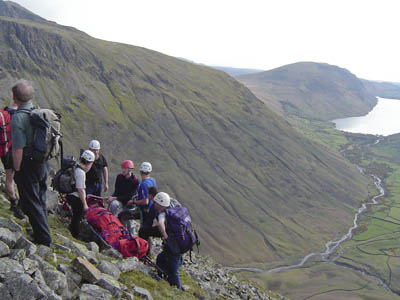 Lake District rescuers were kept busy last year, dealing with more than 400 incidents.
Lake District rescuers were kept busy last year, dealing with more than 400 incidents.
The 13 mountain rescue teams in the area saw an increase of 44 per cent in the number of calls requiring their attention. However, there were fewer fatal incidents on the fells.
Wasdale MRT in action
The volunteers who go to the aid of those in trouble on the mountains of the Lake District spent 20,320 man-hours on callouts. Individual teams were mobilised 567 times to 557 members of the public who needed their help.
The increase reflects various teams’ experiences, particularly the ones in the tourist honeypots, who face the growing problem of inexperienced walkers getting lost on the felltops and calling out MRTs to be guided back to the valleys.
The drop in the number of fatal accidents is probably down to the poor summer. John Dempster, chairman of the Lake District Search and Mountain Rescue Association, said: “It was a pretty awful summer last year. When it is a warm summer, people probably over-commit themselves.”
There were also more incidents involving mountain bikers and rock scramblers.
“This year, we had 12 scrambling incidents, against five over the previous year,” Mr Dempster said. “Mountain-bike callouts were up from six to 16.”
Overall, there were 425 separate incidents logged, some of which involved more than one team being called out. In addition to mountain and fell rescue, the teams also assist in other incidents, such as river rescue and major accident such as the Grayrigg train crash.
Recruitment of volunteers and retaining them can be a problem for some teams when the workload caused by fell callouts increases to such an extent. Mr Dempster told grough: “It can have quite an impact on family and work life.
“A team like Langdale-Ambleside possibly has a problem with recruitment because it is so busy. If you have a job, or if you’re self-employed it can cause difficulties.”
Last year was the busiest since 2004 for the Lakes teams.